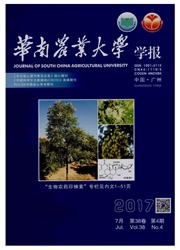

 中文摘要:
中文摘要:
【目的】探寻适合与化肥配施的菌肥用量,以期指导广东省南雄烟区大田烟草施肥。【方法】利用已分离的有益微生物菌株(包括具固氮解磷功能的固氮菌属Azotobacter sp.菌株x34、具解钾功能的芽孢杆菌属Bacillus sp.菌株jb21、属于光合细菌的胶状红长命菌Rubrivivax gelatinosus 菌株sbg11)与有机物发酵配制而成的菌肥,通过烟草大田试验,以不同施用量的菌肥为处理,即CK(清水对照)、T1(化肥)、T2(低用量的菌肥+化肥)、T3(中用量的菌肥+化肥)、T4(高用量的菌肥+化肥),每株按照基肥∶追肥=1∶1的比例施肥。低、中、高用量菌肥分别按照每株基肥10、20、40 g的量施用,所有处理的氮、磷、钾施入总量相等,研究不同用量的菌肥对土壤肥力和土壤微生物的影响。【结果】大田条件下,菌肥+化肥处理能有效提高土壤中有机质含量,显著提高土壤中碱解氮、速效磷和速效钾的含量,增强土壤基础呼吸强度,有效提高土壤中细菌和放线菌数量,降低真菌数量。【结论】中用量菌肥(T3,即每株烟草基肥和追肥分别施用20 g菌肥)增强土壤肥力的效果更明显,可作为该菌肥的推荐用量。
 英文摘要:
英文摘要:
【Objective】 To find a suitable ratio of bacterial manure and chemical fertilizer, and guide fertilizing in tobacco field in Nanxiong area, Guangdong Province.【Method】Bacterial manure was prepared by fermenting organic manure with beneficial microbial strains including nitrogen fixation and phosphate solubilizing bacteria (Azotobacter sp. x34), potassium dissolving bacteria(Bacillus sp. jb21)and photosynthetic bacteria (Rubrivivax gelatinosus sbg11). Treatments with different dosages of bacterial manure, including CK (water), T1 (chemical fertilizer), T2 (low dosage of bacterial manure + chemical fertilizer), T3 (medium dosage of bacterial manure + chemical fertilizer) and T4 (high dosage of bacterial manure + chemical fertilizer), were applied to the tobacco field. The ratio of base manure to topdressing for each plant was 1∶1. Low, medium and high dosages of bacterial manure were corresponding to 10, 20 and 40 g of base manure per plant respectively. All treatments were the same in their total nitrogen, phosphorus and potassium contents.【Result】Under the field condition, the treatments with both bacterial manure and chemical fertilizer effectively increased the soil organic matter contents, significantly increased the contents of alkali-hydrolysable nitrogen, available phosphorus and available potassium in soil, improved soil respiration intensity, effectively increased the number of bacteria and actinomycetes in soil, and reduced the number of fungi.【Conclusion】The medium dosage (20 g base manure and 20 g topdressing ) of bacterial manure applied in the T3 treatment has the best effects, which is the recommended dosage of the bacterial manure.
 同期刊论文项目
同期刊论文项目
 同项目期刊论文
同项目期刊论文
 期刊信息
期刊信息
